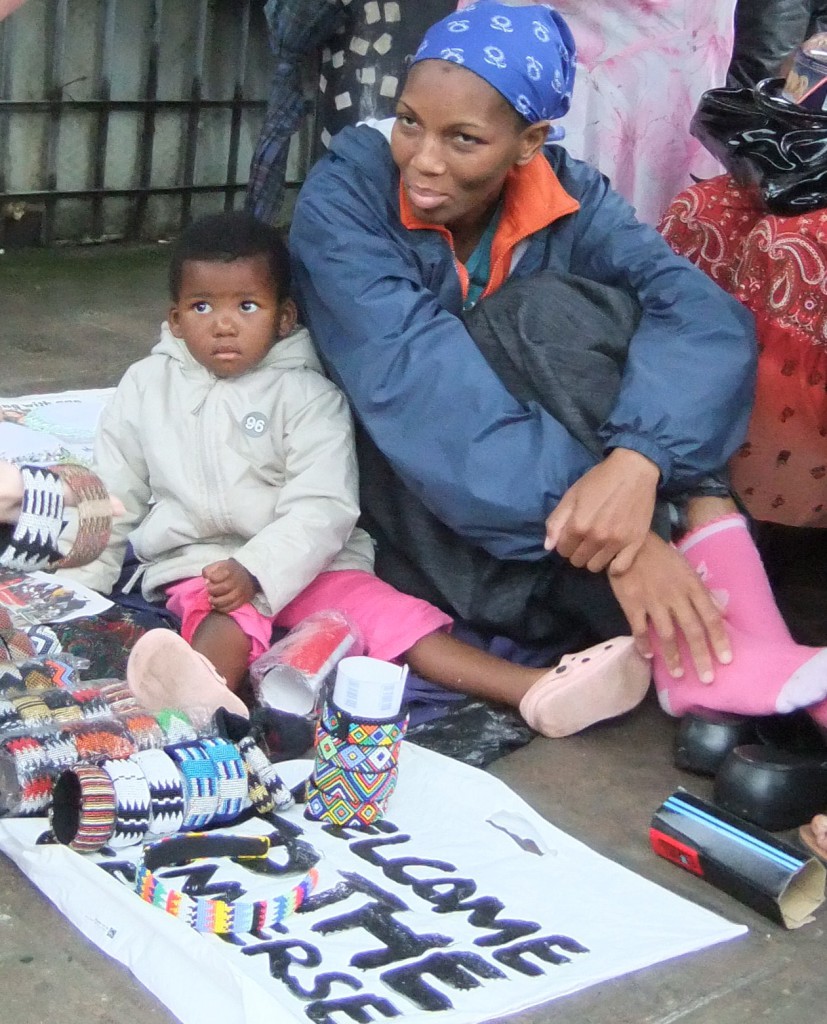Tasmi Quazi
In August 2015, WIEGO published a case study on Vending in Public Spaces and the Law written by Phumzile Xulu, which is a review and analysis of the experiences of Asiye eTafuleni’s (AeT) law programme involving legal education and advocacy with informal workers (also referred to as traders). The case study is based on AeT’s documentation of its law strategies as well as interviews with trader leaders from across Warwick Junction reflecting on the impact of the programme for them.
This article captures some extracts from the full report, specifically in relation to the feedback from participating trader leaders and some featured photographs from the report.

- A worker from Warwick Junction’s Early Morning Market protests the municipality’s failure to consider her livelihood when they approved a mall development plan on the market’s site. Photo & text: WIEGO.
Trader Feedback
As part of a comprehensive Street Law programme developed in conjunction with traders and in partnership with Students for Law and Social Justice (SLSJ) – street law seminars were conducted with just over 120 trader participants between 2010 and 2013. These seminars were used as participatory methods of creating awareness of legal rights, responsibilities and engagement in democratic processes. In an interview with the author, a market committee leader commented:
Street Law seminars provided an invaluable platform for us to learn more about our rights as traders and that the law protects everyone.
In addition, in 2011, a traders’ “Know Your Rights” campaign was developed which included information sessions. The information sessions involved the dissemination of learnings through an “Informal Trading Manual” which was designed and developed by the Legal Resources Centre (LRC) in collaboration with SLSJ students and in consultation with Warwick traders, Metro police, and the City’s Business Support Unit. Before the end of 2012, 15 trader leaders had participated in training sessions on the manual’s contents. A participating trader leader reflected:
The training gave us useful information and I am happy to train other traders in the market where I work and other members of my organization. The manual that we received is important because it reminded us of the importance of paying permit fees on time to avoid being in violation of the trading by-laws and suffer confiscations by the police.
The author further noted that traders do not necessarily trust the government to provide unbiased legal education to informal workers whereas they have more trust in the education provided by AeT. On this, a leader and trader for 30 years commented:
I have enjoyed the training given to us by Asiye eTafuleni. We trust this training because we know that Asiye cares for us. We always mistrust training given to us by the City because we feel that it will only show their side and force us to agree with them. It is a true expression; you cannot teach a dog how to bite you!
Learnings and Achievements
In the learnings and achievement section of the case study, the author concluded that during the four year period of the law programme’s implementation, AeT has been instrumental in achieving outcomes that have made a lasting impact on the work and lives of informal workers in Warwick Junction.
Some of the significant learnings from AeT’s law programme were listed as follows:
- Legal education is important for informal workers as it gives them the confidence to fight for the implementation of enabling policies and legislation;
- Workers who undergo legal education are more able to influence policy and are able to monitor and challenge a lack of implementation;
- It is important for community legal support institutions and organizations like LRC and Pro-bono to partner with grassroots trader organizations in order to build their capacity to organize and recruit more members;
- Engaging with authorities and city and government officials is generally a complicated issue. Informal workers require constant guidance to build their skills and knowledge on how to engage with these authorities;
- Litigation processes are often costly. It is therefore necessary to encourage informal workers to avoid unnecessary conflict situations with authorities by understanding the responsibilities that come with the rights conferred to them by legislation;
- Section 22 of the South African Constitution provides for the freedom of trade, occupation, and profession – in that every citizen has the right to choose their trade, occupation or profession freely. Any law or conduct that infringes this right without offering alternatives is an unjustifiable limitation to dignity;
- AeT’s experience on the ground and the its relationship with the traders has made possible the traders’ cooperation and the participation in this programme, resulting in a successful intervention.
For more information, read the full report here.





Salamaleikun! Viva Tasmin. From far away I follow you. Respect and love for every human being. I praise your wonderful work. I’m in UK, end of January in Brasil. Come to visit us. Happy 2016 and ever.